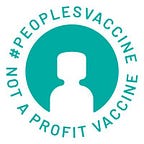The ‘Super League’ still exists for vaccines, and it’s killing people
Fans defeated the Super League for football, we must do the same for vaccines!
On April 18, I sat down in my living room to watch Manchester United play Burnley only to find the broadcast dominated instead by a ‘bigger than any one club’ story.
That morning news had broken that twelve major football clubs intended to form a European “Super League”. It was a catastrophic miscalculation.
It took football fans just 72 hours to obliterate the idea and leave some of the biggest names in football — with a combined market value of 28.6 billion Euros — fighting a reputational fiasco.
The real power behind football was laid bare: the fans, who finally revolted against their teams’ corporate owners having disrespected them as sheep-like “consumers” of tickets, TV and merchandise and, with it, the communal social contract the fans genuinely have with their teams.
Manchester United’s share price dropped 6.6% in a day and it lost its chairman. Club sponsors disengaged. One government contemplated legal action. Apologies and recriminations.
Players from the clubs involved and across the elites of European football raised their voices, like Anders Herrera calling out his objection to the “rich stealing what the people created.”
One by one, clubs fell away from the heat of one of the most effective-ever grassroots activist campaigns that ripped through social media and mainstream press, to placards and effigies and anger outside stadiums, to boardrooms, to governments.
“If there is a lesson here, it is in the startling unity of feeling, the sheer anger at peering in through the stadium gate to see someone rolling up the pitch and feeling not just enraged but empowered by the prospect. It is a feeling of shared force that must be preserved and kept safe for future deployment,” wrote football correspondent Barney Ronay in The Guardian. “Beyond this, the rage, unity and galvanising power of the last few days speak to things way beyond football, to the alienation many people have felt long before the pandemic.”
No COVID Monopolies
Welcome to our world. There is no leap necessary from the Super League fiasco to the Covid Vaccine fiasco.
Using the same blueprint and hard-wired entitlement to commodify and profit, a cartel of corporates is monopolising a “thing” — a global good — without which, in the case of the pharmaceutical sector, people are literally dying. For Real Madrid, read Pfizer. For AC Milan, read AstraZeneca. For Juventus read Johnson & Johnson. For Chelsea read Moderna. Take your pick of colours. Different men in the same suits reading the same spreadsheets. Making the same calculations and assumptions. Pocketing the same change counted in billions of dollars. Protecting the exact same monopoly for the exact same reason.
Even now, with its proposal dead in the water, the European Super League said: “We are convinced our proposal is fully aligned with European law and regulations as was demonstrated by a court decision to protect the Super League from third party actions.”
The Big Pharma companies could literally cut-and-paste this statement and simply replace “European law” with “World Trade Organisation intellectual property law” and rich country governments wouldn’t be horrified or moved in the slightest. They would back them up to the hilt instead.
Because that is exactly what they’re doing right now.
People power
The difference between the two fiascos? The fans — clearly.
Please, read more from the People’s Vaccine Alliance about what’s at stake. About how public interests and public money are captured for private financial gain. About why giving a bunch of corporates the rights of a cartel to control a vaccine is little different from the likes of them controlling the game of football.
No matter what football team you support, or even if you don’t, we’d love you to compare the shocking similarities. And join up with us.
by Rosalind McKenna (she/her/hers), Team Manager, Financing Division, Public Health Program, Open Society Foundations
